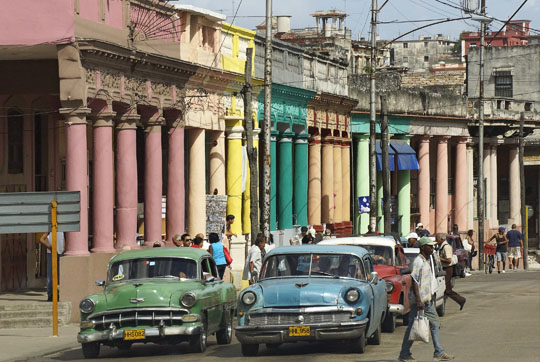
Profiled in The Roanoke Star when he ventured to Cuba as a tourist several years ago, Barry Wolfe – an award-winning photographer when not plying his trade as a periodontist – is hopeful about recent changes announced by Presidents Obama and Raul Castro when it comes to the relationship between the two countries.
President Obama announced a loosening of restrictions on travel and money going back to Cuba. The trade embargo that has been in place for more than fifty years however, will have to be lifted by Congress and that’s an iffy proposition politically at this point.
Wolfe traveled to Cuba the way most U.S. tourists have had to do so over the past half century – under the guise of an educational program (Insight Cuba in his case) that is allowed to venture to the impoverished Communist island nation in the Caribbean.
On his trip Wolfe encountered welcoming people who live a simple life without frills for the most part, surrounded by a crumbling infrastructure. Pre-Revolution 1950’s era American automobiles – the only ones allowed, and pastel-painted buildings that masked the condition many were in.
“The people are wonderful [but] by our standards are quite poor,” Wolfe recalls almost three years later. “There’s not a lot of commercial activity [or] stuff to buy. Nothing exotic at all.” The infrastructure is “strikingly in disrepair. Nothing’s been done to it for 55 years.” When the Russians left after the Cuban missile crisis was defused during the Kennedy Administration there was even less money to spend on needed projects, said Wolfe.
In many cases, said Wolfe, buildings appear to be too far gone to renovate. “You need a bulldozer. You can see the old beauty but it’s in tremendous disrepair.” Wolfe said he was “thrilled” to see the news, a change not greeted warmly by everyone – some think the embargo and other restrictions should remain in place until Cuba makes more strides on human rights issues.
Obama’s contention in making the changes via executive action is that 50-plus years of the embargo have not driven the Castros from power (first Fidel, now Raul) so why not try a different approach? “The people [there] are dying for the things we take for granted,” said Wolfe,” internet, satellite TV, phones. They just can’t get enough of it … and there’s nothing there.”
Think of an island as big as Florida “with 360 degrees of undeveloped beachfront,” he notes. Cuba restricts citizen boating as well, fearing that those who want to escape the Communist regime will attempt to make their way to the U.S. – just 90 miles away are the Florida Keys. “The big [developers] in this country are just probably going crazy – the [Steve] Wynn’s, the Trump’s and all those groups.”
Wolfe is surprised that President Raul Castro was willing to do his part in loosening travel restrictions from Cuba – noting how citizens there have had to apply to the government in the past, seeking permission. “That was a very iffy deal.”
He sees the changes as a first step that will help Cubans tremendously. “I have a feeling that once the doors open they [will have] an insatiable hunger for improvement. The people are great but they’ve been kept under a very controlling atmosphere.”
He’s no political scientist either but Wolfe doesn’t think the Communist system can withstand the “free market onslaught” that opening Cuba more to the U.S. would bring – the tourist dollars and the consumer goods. That may just be what President Obama and other American officials are banking on. “I’m excited about it – I think it’s great. I loved it there.”
By Gene Marrano


